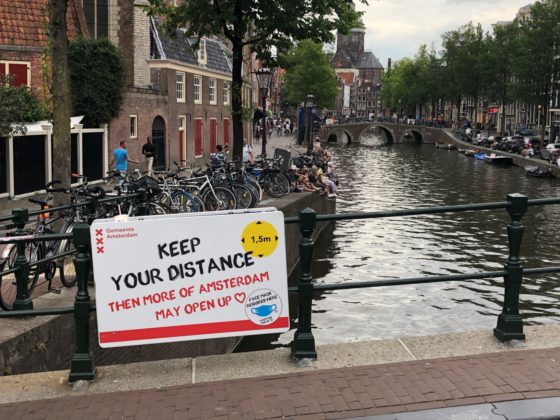Amsterdam and Rotterdam stop requiring face masks in busy places


Amsterdam and Rotterdam are stopping an experiment with face masks in busy places at the end of August. Both said that they were halting the experiment ‘as planned’ and will be waiting for the results of investigations to see how effective the measures have been.
In a press release, Amsterdam added that ‘depending on the level of infections in the city’ as well as these results, it would decide whether or not to reintroduce obligatory face masks.
Last weekend, it announced that enforcement officers had handed out 148 fines of €95 for non-compliance, reported the Parool. However, when reporters including DutchNews.nl visited the Red Light District – one compulsory area – the majority of people on the streets appeared not to be wearing them. Some reports suggested that only 20% were following the rules, increasing to 80% if street wardens intervened.
Spike
Rotterdam and Amsterdam were given the go-ahead to introduce facemasks in busy areas by the national government early in August as their coronavirus infection numbers spiked, to see what effect they had on distancing and public awareness.
There has, however, been constant scepticism from the RIVM public health institute about how effective non-medical face masks are in preventing the spread of the coronavirus in real-life situations. The government has instead emphasised the importance of limiting visitors at home and keeping a 1.5m distance.
The face mask experiment, which started in early August, covered five locations in Amsterdam, including the Plein ’40-45 and Albert Cuypstraat markets during operational times, plus busy shopping streets in Rotterdam, two shopping centres and all large markets there.
Court
In Amsterdam, a group of protesters tried to overturn the face mask ruling in court but although the judge ruled that it was an infringement of basic rights, the temporary nature of the experiment meant that this did not merit legal action. However, some shops and analysts said that they were getting far less footfall, with more than 35% fewer visitors in areas with compulsory face masks, according to a study for the Parool.
A spokeswoman for Rotterdam mayor Ahmed Aboutaleb told Dutchnews.nl that compliance had been far greater in her city. ‘We had a different experience with it,’ she said. ‘In the last week when we started to be more repressive in our way of controlling the crowds, we have seen a lot of people committed to wearing a mask. The first day that we were stricter, we saw only four penalties instead of Amsterdam, where there were about 150. We are very happy to see that people are positive about wearing a mask when addressed, but we ended the experiment as planned and are waiting for the investigators to come with their report.’
Femke Halsema, Amsterdam mayor, said in a statement: ‘The experiment will be ended on 31st August as planned. Depending on our independent evaluation, infection level and how busy the city is in September, we will look at how to proceed.’
The NSCR Netherlands Institute for the study of crime and law enforcement will be publishing a study on the extent to which the face mask rules were followed and whether they helped regulate crowds and maintain the 1.5m distancing.
Thank you for donating to DutchNews.nl.
We could not provide the Dutch News service, and keep it free of charge, without the generous support of our readers. Your donations allow us to report on issues you tell us matter, and provide you with a summary of the most important Dutch news each day.
Make a donation